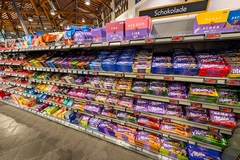
- Industry news
Industry news
- Category news
Category news
- Reports
- Key trends
- Multimedia
- Journal
- Events
- Suppliers
- Home
- Industry news
Industry news
- Category news
Category news
- Reports
- Key trends
- Multimedia
- Events
- Suppliers
MGP Reports Sales of Food Ingredients up 10 Percent Vs Year Ago

06 Aug 2013 --- MGP Ingredients, Inc. has reported results for the second quarter ended June 30, 2013. Net income for the second quarter was $280,000, or $0.02 per diluted share, compared with a net loss of $850,000, or a loss of $0.05 per diluted share in the prior year.

Net income (loss) comparisons are positive compared with a year ago despite reduced volume of industrial alcohol, higher commodity prices, and some temporary operational interruptions. The Company expects continued year-over-year sales declines in industrial alcohol for the remainder of 2013. In 2012 the Company's distillery segment included sales of alcohol under a marketing agreement with Illinois Corn Processing (ICP). The marketing agreement expired effective January 1, 2013. The Company has not sourced product from ICP since April 2013.
Net sales for the second quarter declined by approximately 7 percent from the year-ago period. Higher beverage alcohol sales were offset by lower sales of bulk industrial alcohol. Demand for the Company's portfolio of whiskeys and bourbons remains strong. Production of new distillate at the Indiana facility continues to grow. While distillery production has more than doubled since the operation was acquired at the end of 2011, MGP is planning further increases in output to support anticipated growth. Higher ingredient sales in the second quarter were led by strong demand for specialty starches and wheat proteins used in a variety of food applications in the U.S. and internationally. The Company's latest innovation is a lightly hydrolyzed wheat protein named Optein, which targets a number of applications such as nutritional drinks, smoothies, meal replacement bars and sports beverages. There were no sales in the Company's other segment due to the sale of the bioplastics manufacturing business on February 8, 2013.
The Company's gross profit in the second quarter of 2013 declined from year-ago levels, largely driven by the lower contribution from bulk industrial alcohol sales and higher input costs compared to a year ago. During the second quarter of 2013, the Company experienced unanticipated operational issues, including incoming power supply interruptions in Atchison, KS on three different days, which negatively impacted manufacturing output. Second quarter income from operations was $511,000 compared to a loss of $545,000 in the second quarter of 2012, due mainly to lower selling, general and administrative expenses year-over-year.
For the first six months of 2013, net sales declined by approximately 3.5 percent to $165.7 million. This was mainly due to a decrease in net sales of distillery products partially offset by increased net sales of ingredient solutions. For the year-to-date period the Company generated a gross profit margin of 7.5 percent compared to 6.7 percent in the prior year period. Income from operations for the first six months of 2013 was $1.8 million compared with a year ago loss of $2.8 million.
"Growth in the premium side of our business is gaining momentum. This is helping to offset the continuing commodity volatility and low margins in bulk industrial alcohol," said Tim Newkirk, President and Chief Executive Officer. "We also experienced a temporary production shortfall in the Atchison plant this quarter, without which our operating results would have looked much like those in the first quarter. That doesn't mean that we are satisfied. Not by a long shot. We're doing everything we can to cost optimize our bulk industrial alcohol business while supplies of U.S. corn are scarce. After back-to-back years of drought, and the resulting decline in physical corn stocks, industry experts are anticipating improvements by the end of this year's planting season."
He continued, "With greater liquidity in the corn markets MGP will be better able to match our costs and contract pricing. That's the key for achieving acceptable gross margins in our industrial grades. In the meantime, we continue to shift our portfolio to higher profit products while driving our per-gallon costs lower. This business has been a significant cash generator in the past, and we expect it to do so again in the future.
"With our premium portfolio of whiskeys and bourbons we face a different kind of challenge: keeping up with demand. The supply shortage persists for both new and aged distillate in the U.S., as evidenced in announcements by several major market participants. MGP is one of the few independent producers of quality spirits, and that's why our pipeline of new sales opportunities continues to grow. This growth, along with other customer orders dating back to 2012, is driving the need for increased production levels of brown goods at our Indiana distillery."
Distillery products net sales for the second quarter were $63.9 million, a decrease of 10.2 percent compared to the prior year quarter. Increases in sales of premium spirits, whiskeys, bourbons and distillers feed were offset by the 95 percent reduction in the supply of bulk industrial alcohol from ICP over the same quarter a year ago.
The distillery products segment reported second quarter pre-tax income of $3.1 million, or 4.9 percent of net sales, compared to pre-tax operating income of $3.7 million, or 5.3 percent of net sales, during the same quarter a year ago. Quarter over quarter, pricing for distillery products was out-paced by increased costs for raw materials. For the second quarter, the per-bushel cost of corn averaged 14.4 percent higher than a year ago.
For the first six months of 2013, distillery segment sales were $134.7 million, a decrease of 6.2 percent. The distillery products segment reported pre-tax income of $7.4 million, or 5.6 percent of net sales, compared to pre-tax income of $6.4 million, or 4.5 percent of net sales, during the same period a year ago. Despite decreases in volume and pricing, the improvement in product mix led to a higher return on net sales.
Ingredient segment net sales for the second quarter were $15.4 million, an increase of 9.9 percent from the prior year's quarter. Sales benefited from both higher average pricing and unit volumes, with specialty starches showing the largest net sales gains.
The ingredients segment reported second quarter pre-tax operating income of $875,000 or 5.7 percent of net sales, compared with income of $987,000, or 7.0 percent of net sales, for the same quarter a year ago. Gross profit margins decreased mainly due to higher raw material costs. The most notable was for flour, which averaged approximately 23.5 percent higher per pound over the prior year.
For the first six months of 2013, ingredient segment net sales were $30.8 million, an increase of 11.6 percent from the prior year period. The segment reported pre-tax income of $2.6 million, or 8.6 percent of net sales, compared to pre-tax income of $2.6 million, or 9.5 percent of net sales, during the same period a year ago. Similar to the results for the second quarter, gross profit margins for the six months decreased mainly due to higher raw material costs. The cost of flour increased by an average of 21.2 percent per pound over the prior year.
Newkirk said, "As a producer of alcohol since the 1940s, we are no strangers to grain cycles. However, this one has been particularly tough. On top of tight corn supplies we've faced intense price competition in the lower value alcohol grades. The proactive steps we have taken to increase our operating efficiencies and lower our costs along with efforts such as strategic sourcing for corn, have enabled us to operate with significantly lower levels of working capital while dramatically reducing the potential for mark-to-market volatility in our income statement.
"While our work is not yet complete, we've come a long way in shoring up MGP's legacy business in high quality alcohols. Our ingredients business has turned around and continues to grow profitably. We're executing on the things within our control, such as getting the right products to the right customers, creating new innovations, and improving our asset productivity."
He concluded, "As we continue to drive toward stronger cash flows from our bulk industrial alcohol business, our immediate focus is on expanding production of premium whiskeys and bourbons at our Indiana facility to capitalize on the increased demand. Our Lawrenceburg facility has ample capacity and we are focused on implementing operational improvements to maximize production. Premium spirits offers our best long-term opportunity for revenue and profit growth. With a solid base of core customers, we continue to pursue new sales agreements with both branded spirits companies and distributors."










